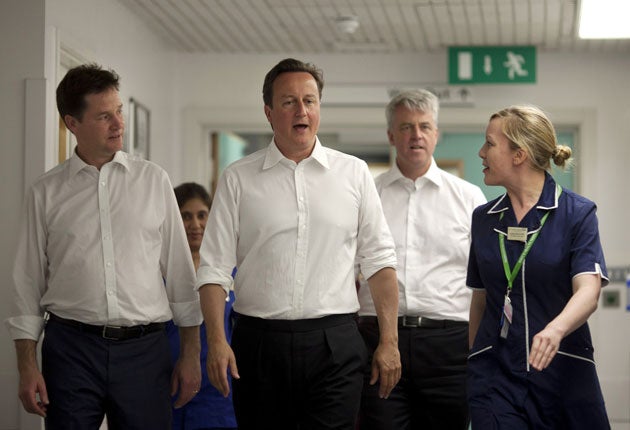Battle over fate of struggling NHS services

Your support helps us to tell the story
From reproductive rights to climate change to Big Tech, The Independent is on the ground when the story is developing. Whether it's investigating the financials of Elon Musk's pro-Trump PAC or producing our latest documentary, 'The A Word', which shines a light on the American women fighting for reproductive rights, we know how important it is to parse out the facts from the messaging.
At such a critical moment in US history, we need reporters on the ground. Your donation allows us to keep sending journalists to speak to both sides of the story.
The Independent is trusted by Americans across the entire political spectrum. And unlike many other quality news outlets, we choose not to lock Americans out of our reporting and analysis with paywalls. We believe quality journalism should be available to everyone, paid for by those who can afford it.
Your support makes all the difference.The battle over the future of Britain's hospitals intensified this week as leaked government plans suggested it could become more difficult to close failing services and institutions – something that NHS managers say is essential in order to save the rest.
At least 50 NHS trusts are in severe financial difficulty as a result of the unprecedented squeeze on NHS finances as managers struggle to find £20 billion savings by 2014.
In addition, doctors' leaders say medical expertise is spread too thinly across the country and must be concentrated in fewer specialist centres to ensure the delivery of safe, high-quality care. This week the Royal College of Obstetricians and Gynaecologists said consultant-led maternity units should be reduced in number and increased in size. But ministers have balked at the challenge of closing local hospitals and units to save cash and improve care because they fear political unpopularity.
Yesterday, the Royal Brompton Hospital in London became the first NHS institution in the country to challenge in the courts a proposal to close its children's heart unit. The trust won a judicial review of the decision to reduce the number of units in London from three to two for safety reasons.
In Salford, 37,000 people signed a petition against closure of the maternity unit at Salford Royal Hospital, which was handed in to Downing Street. In Kent, Tory MP James Brokenshire intervened to halt the closure of maternity services at Queen Mary's Hospital, Sidcup.
The worst affected area is London, which has the largest number of debt-ridden hospitals and is over-provided with beds compared with the rest of the country.
Imperial College Healthcare Trust, the largest in the country with a budget of £910 million, is facing debts that have grown to an estimated £70 million despite an extensive cost-saving programme.
Andrew Lansley, the health secretary, has repeatedly postponed a decision on Chase Farm Hospital in Enfield, north London, which was first earmarked for closure 17 years ago. Plans to transfer its accident and emergency and maternity departments to neighbouring hospitals were approved last Christmas but Mr Lansley has since delayed execution of the decision twice and will reconsider it for a third time next month.
In the latest development, Mr Lansley has rescinded plans for a market-driven insolvency regime in which the weakest trusts would go to the wall. In its place is a proposal that will provide protection for most services, but at a cost of £500 million a year.
Mike Farrar, chief executive of the NHS Confederation, criticised moves to delay closures that were essential to improve efficiency and safety. "We need political courage. If we can't do these things quickly, the alternative is going to be cutting services to live within the budget," he said.
Join our commenting forum
Join thought-provoking conversations, follow other Independent readers and see their replies
Comments